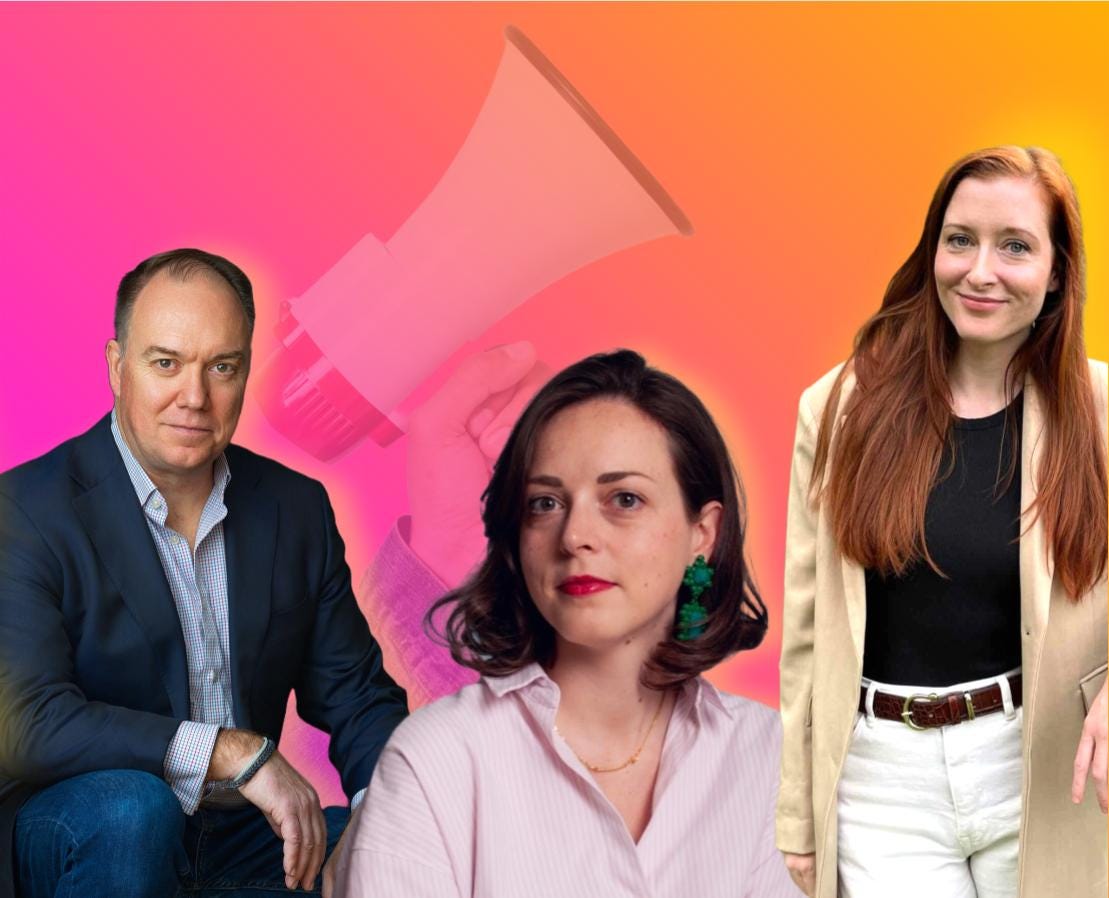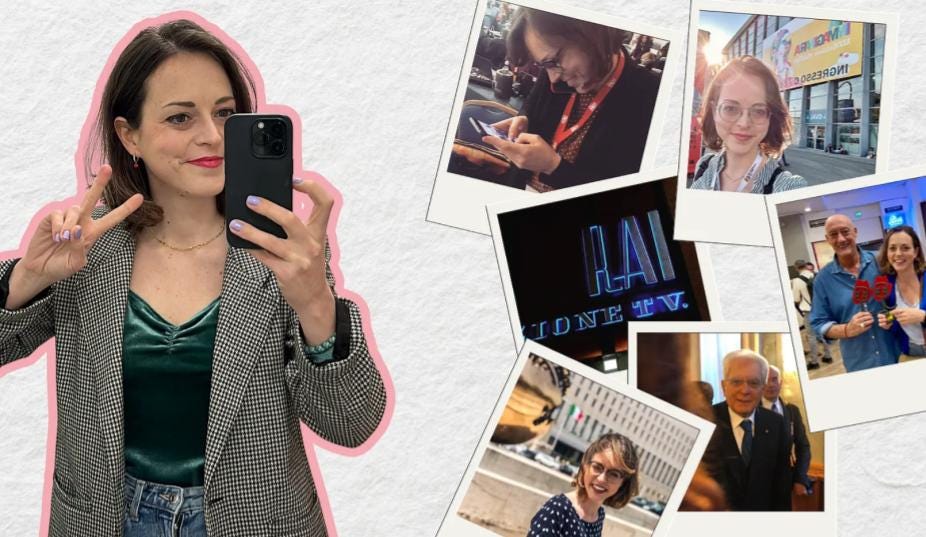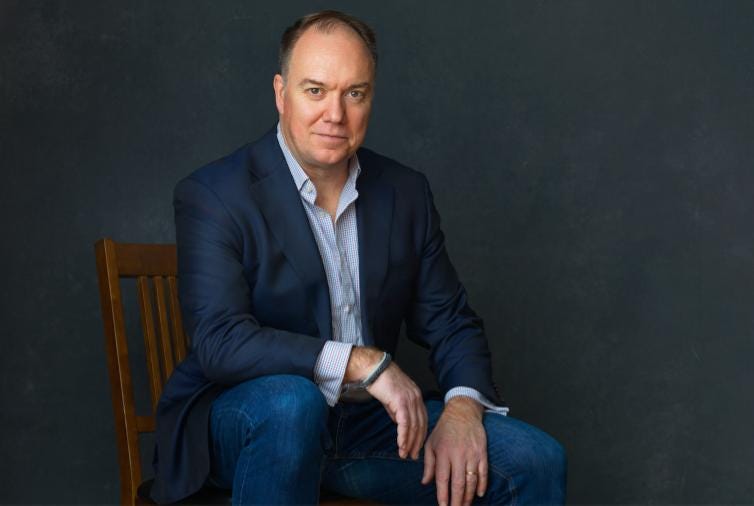Part 4 — What are the digital trends for politics and diplomacy?
Let's continue our conversations and interviews on content, creative ideas, and predictions for 2025 trends for social media, digital marketing, and tech diplomacy.
💬 Quick CONVERSATION STARTERS this week:
Lia Haberman’s 20+ predictions from creators and digital creatives (we’re included!)
“Digital (and increasingly AI) is changing the balance of power between governments and citizens”
❤️ Our Substack journey has just begun but we’re humbled by the many of you who are already entrusting us in your inbox every week.
Thank you! Grazie! धन्यवाद! Merci! 谢谢! Gracias! ありがとう! Danke! شكراً! Obrigado! Asante! Or, in binary, 0s and 1s…
01010100 01101000 01100001 01101110 01101011 00100000 01111001 01101111 01110101Let’s start…
Before we delve into this Part 4 of our current Substack series on digital trends, we need to thank
, author of and creator economy and marketing extraordinaire, for including us at in her latest post featuring 20+ predictions from creators, brand marketers, social strategists and industry leaders! What an amazing and exciting look at digital trends and what to expect in 2025! Excited to see what the new year will bring for creators and digital creatives.💥 Lia’s ICYMI is a MUST-read! 💥
Now, as for Part 4 of our new series, we’re honored to have
, Dan Morrison, and Patricia Gruver-Barr share their hot takes on the intersection of social media, technology, politics, and diplomacy.Thank you also to Dante Licona,
, Marco Ricorda, Stéphanie Fillion, Roxy Ndebumadu, Gerry Diaz Bartolome, Anja Gabriel, and for they invaluable contributions in Part 1 and Part 2 and Part 3.More to come soon!
“Even before AI we had more content than we could ever want in the whole universe and the reason that people subscribe to a Substack is not, OG, I don't have enough emails to read and I wish I could pay money to get some more. The problem you have in a world of abundant content is how do I allocate my scarce attention. You know what AI has not given us yet, is more seconds to be alive.”
— Substack's CEO
interviewed by
Valentina Tonutti: “Social media is not just a megaphone, it’s a conversation”
* Valentina Tonutti is a freelance social media manager and consultant with 10+ years of experience helping clients in publishing, journalism, and entertainment, crafting impactful social strategies. She shares behind-the-scenes tips for social media managers through her TikTok channel and her newsletter,
.1) You’ve recently written about the digital and social media side of presidential transitions in the United States. What are your key takeaways?
Presidential social media transitions show us how social platforms are changing for everyone. They highlight the importance of details — how even the smallest elements on social media contribute to a larger narrative. In a way, these transitions are acts of digital diplomacy: what about previous content? Is one platform prioritized over another? There are not so many written rules. The Trump-Musk era, in this sense, will be particularly interesting to observe.
2) What is your advice for world leaders, politicians, and diplomats to better leverage social media and technology?
Leaders should focus on authenticity, transparency, and adaptability. Social media is not just a megaphone, it’s a conversation. Tailor your voice for each platform, engage with your audience, humanize your brand, and stay consistent in tone and message.
3) What are your predictions for digital diplomacy next year and beyond?
I think AI and machine learning will play a larger role in crafting personalized content and monitoring sentiment on social media!
Dan Morrison: “Digital (and increasingly AI) is changing the balance of power between governments and citizens”
* Dan Morrison is a global communications/public affairs exec working at the nexus of business, geo-politics/economics, tech & AI. Formers include: Bloomberg, IBM, the U.S. State Department, the OECD and the Pew Research Center. He is Founder & Managing Partner of the thought leadership and geostrategic communications firm, StoryVenture, and an adjunct professor at Johns Hopkins University. He's also a Techstars mentor, an author, and an investor.
1) What are your top advice and recommendations for leaders in government and the private sector to be the best communicators they can be in this fast digital age?
In a world of minimal trust, it's crucial to demystify your goals quickly. If you don't tell your story in the digial age, someone else will. Leaders must also be agile, learn from what the data mirrors reveal, and pivot as necessary. They must have a Spidey-sense for knowing when to respond to criticism (or not), or when to lean into societal issues (or not). Digital (and increasingly AI) is chaging the balance of power between governments and citizens by giving citizens even more voice and agency.
2) Has AI changed — or will it change — the way we approach communications in areas like politics and diplomacy?
AI will walk with us into the future, whether we like it or not. I also think it's important to note that AI isn’t something happening TO us, it’s something happening WITH us. The impact on politics and democracy will be profound.
AI will initially help politicians and diplomats on two fronts -- content and analysis - i.e. hyper-personalized messaging, writing, message consistency, tracking public sentiment, predicting voting behavior, analyzing open-source intelligence, and forecasting and scenario planning around geopolitical developments. In the battle between those throwing stones and those having to fix the broken windows, AI will help organizations with their crisis communications via machine learning to monitor news, identify patterns, and minimize damage. It might help predict the outcomes of elections and referenda with greater precision than polls, thereby helping political campaigns make more informed decisions on where to spend their time and money. At the same time, AI has accelerated expected reaction times, which is not always a positive. It will make mis/disinformation worse before it gets better, while at the same time acting as an antidote to combat it.
AI will be helpful and unhelpful in the same breath. My work with clients and students has convinced me that AI will be a valuable co-pilot for promoting critical thinking by helping us poke holes in the tribal arguments we hold so dear. It will offer greater insight into the "other." Like the oracles of the ancient world, AI provides plausible answers that communications leaders must filter with human judgment. In addition to critical thinking, I could imagine AI being deployed within citizen assemblies, for example, to help with facilitation, information gathering, consensus building and even generating AI policy. On the negative side of the ledger, AI could give governments unprecedented surveillance power over citizens, and could undermine democratic values. Those who harness AI for good will serve their publics and stakeholders well.
3) What are your predictions for digital and social media next year and beyond?
Legacy media will continue to struggle at the hands of digital and social media. Decentralized platforms that prioritize user privacy, data ownership and content moderation will gain traction, as will micro-communities, but I fear these may lead to increased polarization, which will add increased pressure on politicians and diplomats. The line between digital (avatars) and human influencers will blur. I could imagine scenarios where bots will be used for political and diplomatic crises to disseminate information, combat misinformation and shape narratives. In politics, digital and social will continue to be used to micro target voters, to promote events, to conduct social listening, and to allow campaigns to refine messaging and stakeholder outreach.
Patricia Gruver-Barr: “Governments need to stop being afraid to confront big tech for some of the harms that these companies cause to society”
* Patricia Gruver-Barr is Director of the Commonwealth of Pennsylvania Science & Technology Policy Program and Co-Founder of the Tech Diplomacy Network. She previously served as Associate Director for Innovation Ecosystems at the University of Pennsylvania, Senior Fellow at New America, Tech Policy Manager at the Meridian International Center, and Tech Diplomacy Fellow at the Pacific Council on International Policy. She was also a Research, Innovation and Trade Attaché for the Quebec Government Office in Boston.
1) What are some of the most pressing tech issues diplomats, governments, tech companies, and civili society are trying to tackle today?
Misinformation (whether it’s related to climate change, health, or politics) is rampant in today’s society. We have to do a better job at developing solutions to tackle this issue.
2) What can governments do better to work with big tech? And what can tech companies do better to work with governments?
I think governments need to stop being afraid to confront big tech for some of the harms that these companies cause to society. Governments are so focused on not stifling innovation that they have forgotten that their duty is to their citizens, not corporations.
3) What are your predictions for tech diplomacy next year and beyond?
I think we’ll see big tech accumulate more power under the next U.S. administration, particularly with Elon Musk having the ear of the president. I think the U.S. might take a step back in its role as a leader in digital diplomacy, and focus more on promoting innovation, than improving the digital commons. As a result, we might see European countries take a larger role in this space, sending more diplomats to Silicon Valley to liaise with big tech.










Very happy to share what I know. Thank you for reaching out.
Thank you for having me!